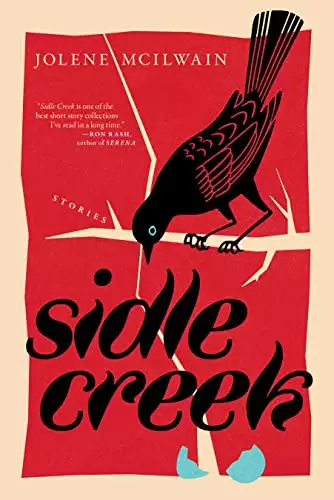Sidle Creek
The first rock wall Esme Andersen built was in 1975 when she’d just turned twenty and was halfway through an engineering degree. Her father had been diagnosed with MS, and she was home from college for the summer. People said she was pregnant—“Look how bloated that belly is”—but she’d never been with a man. She just passed clots and passed out a lot. “That’s why they scraped her out,” Dad said. “Ended up taking everything. It’s a pity, you know.”
I didn’t quite know.
Esme and her dad took trips to the creek bed every day for two weeks that summer, gathered up flat rocks from the slippery bottom of the Sidle to build the wall. The rumor was Esme kept adding stones on days she felt well, sometimes only a few—toiling over making the fit right, a half turn here and there. When she was poor and in pain, she claimed she felt the hum of protection within the kissing stones of her very own rampart.
After her father died, Esme ended up living alone behind that dry-stacked wall, being called strange, a fool. But I adored the wall, how it held.
Back when we first moved next to Sidle Creek—not a large creek but cool enough for trout—a man who’d been blinded by welder’s flash got his sight back when he fell into its water. When Dad gave directions to our house he’d say, “Follow Sidle from the bridge near Colwell’s Cemetery about three quarters of a mile out Stone Church Road. If you get to the old pump station, you got out too far.” He’d add, “You won’t see our house from the road, so just turn right where the creek takes a sharp bend to the left—where Prichard got his sight back—and you’ll see our drive.” How strangers could have been helped by his directions was lost on me, but no one questioned them, and every time someone said, “What do you mean got his sight back?” Dad would tell the story about how the Sidle’s water cured Mr. Prichard.
Granddad had a bleed at the muddy bank of the Sidle the same year my mom left. His best fishing buddy, Lee, gave him sips of whiskey thinking it was a clot that could thin, but it was a different kind of stroke. “Hemorrhagic” read the death notice. Dad repeated the word three times, slow. Dad said Lee couldn’t have known when he held the bottle’s lip to Granddad’s he was making his death come swifter. For a long time, he wondered what might’ve happened had Lee let Granddad drink some of the Sidle’s water instead, but decided it was all good. “He didn’t have to suffer years of half a life, unable to talk or walk or dance or fish. No one should have to suffer.”
But when Granddad showed up in everyone’s dreams, even the neighbors’, he had dirt all over him. “Just that dried-out topsoil from trying to get back to us from his grave. Not the muddy silt from the Sidle,” Dad said. “Don’t you worry. He didn’t fault the creek. He loved it pret’ near as much as he loved us.”
Before my uncle Bobby went away to the pen, back before his layoff at the mine and his broken marriage and the drug bust and the helicopters hovering over the hunting camp while state boys dragged him from the attic with bits of pink insulation stuck to his shirt, we all fished together at Granddad’s spot, like some happy family. But the truth is my dad might have sooner just gone alone. We kids were too loud. Spooked everything. And Uncle Bobby used weird things for bait that day. Hot dogs, Pop-Tarts, bubblegum, carrots.

Late-season snow runoff, and a bout with the wrong side of manic, sent Miss Turner into the deepest channel of the Sidle with stones from the Allegheny River weighting her coat. “She’d given it some thought,” Dad said. Those river stones were smooth and small—unlike the bulky, irregular creek stone covered up in the high-water rush—and she could fit them nicely into the woolen coat she’d sewn with extra-deep pockets, some said, exactly for this deed. Two anglers scouting for spots to stock rainbows tried to pull her from the high cold. One of the Colwell boys, a newly minted volunteer fireman who’d completed fifty-two of seventy-two passes in the final game of his senior year, overhanded a throw bag to each of them, landing the bags right at their chins. Still all three abided feverish shivering fits of hypothermia for a handful of days in the ICU. Miss Turner lived three more years before something like cancer nettled into her woman parts and offed her slow and terrible. Dad blamed Miss Turner for using the creek wrong. He blamed her for the fact that the browns weren’t taking night crawlers that season. He swore her actions cursed the line, cursed the hooks.

Dad always said attractor dries were best for catching wild browns. I tried every fly in the box, every single one clatched to my hat. Caught my best brown once when the stream was high and thick after a hailstorm. Filled my waders, nearly drowned. I cried out for help but no one heard. “You got yourself out. Found good footing on that creek bed. That’s what counts,” Dad said, patting me on the shoulder, then hugged me tighter than he ever had in my whole thirteen years.
That night I dreamed I kept finding something stuck on the undersides of rocks, stuck to the slippery green of them, and how it stuck I couldn’t figure; I worried it would tack over the whole run. It was stuck to everything. When I woke up, my panties were full of blood. I told Dad and he said, “That’s natural. It’s time. Go to Mom’s closet and get her napkins in a pink box,” and I did. They were right beside the pretty purses and shoes in boxes she’d left behind when she left me behind too, two years before. He said, “Let’s go see how they’re runnin’ today.”
I knew the blood would come. I’d learned about it a few years before. I just thought it was much, much more than it should be. Shiners, in the minnow bucket, darted left and right. Night crawlers we filched by the light of night’s moon tunneled dirt in the coffee can. Bait. “Live things to catch live things,” Dad always said each time he slipped the thin hook through a slippery body, but I heard it different that day.
He cast. Set the pole in the wooden wye he carved from a cherry tree branch.
“Always use thin wire hooks and rig close to the tail so it can still move a lot. Or through the top of its back. You want it lively in the water. Just as it would be if it wasn’t on the hook.”
I nodded and straightened my back, rubbed at my spine. He glanced at me, then grabbed a minnow from the bucket and placed it in my palm.
“Hold on to that for a sec,” he said. He pulled his lighter from his shirt pocket and relit the charred end of his cigarette. Took in a long drag. I watched the smoke come out his nose and thought of gills, of the insides of our lungs, and wondered if they were red, too. The minnow’s tickle made my throat burn, made me want to clamp tighter, but I didn’t want it dead. I blinked. I swallowed all that extra saliva. I thought about where he’d slip the hook through the one I held.
That’s when he said, “Uncle Fatso takes them close to the eyeball and through the snout. They’ll wiggle then.” He laughed. “Here,” he said. I opened my hand and watched its shine flip to the ground. “Son of a bitch,” he said, stopping it with his boot from flip-flopping its way toward the water’s edge. He grabbed it after two tries and handed it to me again. “Don’t worry, you can use them like this, too. Hook straight through both lips. See?” I rolled my lips in while he slid the dead minnow on my line’s hook. “Living or dead they still look good to the trout.” He took in another drag and winked.
We moved to nightcrawlers then. We waited for a hit while the other worms burrowed deep to the bottom of the can, away from the light splashing through the trees that lined the bank. I couldn’t help staring into the minnow bucket, watching their frantic flickers, their wild eyes.
Five bleeds later, I got hints when it would come on. Angry at my cowlick. Lonely. Fish looked sad. It scared me, this thing happening to me. Hurt all over. Made me slow. Run-down.
“Maybe flow’s off a little,” Dad said. “Maybe it’ll straighten out.” Though he told me that before Mom left us for Jesus and moved to a place in upstate New York to be nearer His Grace and Love, she’d had the exact same kind of pains. He wanted to take me to Crazy Miss Jean for a tincture, but I was so scared of her that I refused to go.
So, again, he took me fishing. We caught our limit quick. Let the gutted fish soak in salt water in the sink all day. After supper, Dad said, “Let’s have a sundae.” I couldn’t bring myself to grab the maraschino cherry jar that always sat next to the salmon eggs after I spotted the canned plums. They looked too much like the clots that dropped from inside me.
“Hot fudge is plenty,” I said.
In those five months, I’d learned to hate all things red.
That frightening leaking out came again just as I was halfway done with the sundae, sending the bowl clanging into the sink and me running to the bathroom. When I sat on the toilet, I imagined my own eggs sliding to the bottom of the porcelain while I peed.
“You okay?” Dad said from behind the bathroom door.
“I’m fine,” I said, shoring up my voice box to keep at bay any sound of stupid crying.
After eight bleeds, Dad told me to head out to the Sidle, wade in the water some. Might cure me from bleeding so much. But I worried the Sidle couldn’t help me, and I didn’t want to use the creek wrong like Miss Turner, didn’t want to spook the fish away. He said, “Regular season’s over. They’ve slowed by now.”
Cramps woke me. Cramps kept me home from school. Headaches weighted my eye sockets.
Snow came early. I tried to think about the cool creek water, how oxygen would be swelling, how trout hens would be building nests in the gravels, deep in the redds, to home their eggs.
A year more had passed when Dad said, “I can’t have you suffer,” and went to Crazy Miss Jean without me. She said it was a malady no one aspired to study for a long time. She said she had it, too, ‘til she went through the change. She said people still think it’s fake, a lie. She told him what kinds of stones to find at the Sidle, gave him a bottle of paregoric and told him to mix it with sugar.
“It tastes like black licorice gone bad,” he said and held the tiny whiskey glass to my lips. I forced myself to drink it.
Warm, warmer. Cramps eased, eyelids drooped. Rest came. Until pain rippled again.
Miss Jean told Dad to “search for a keen doctor who’ll listen.” She said it might take years. She gave the awful thing a name. “Endometriosis, endometriosis, endometriosis,” Dad said.
I repeated it. It didn’t sound half as mean as it was.
Dad said, “It’s a dirty rotten shame.”
In my floating self, I said, real quiet, “Will you help me build a wall, Dad, from both creek rock and river rock? It’ll be knee-high and I’ll plant flowers to line it.”
“Sure will,” he said.
From the steeped water in the pot, Dad took the smooth flat stones he found near the redds where the trout laid eggs. He placed the warm stones right on top of my belly where Miss Jean said my ovaries and uterus ached underneath. I could feel the Sidle’s love walking deep inside. It made me want to live.
I stared at the rainbow Dad had mounted on my wall. I’d caught it on opening day near the bend where Lee cut the line on his palomino when he saw Granddad slump, where he held whiskey to Granddad’s lip. The shininess, those pretty dots, that magenta line the length of it. Its colors buoyed me. It stared back at me with its hopeful eye.
We hope you are enjoying the book so far. To continue reading...
Copyright © 2026 All Rights Reserved

